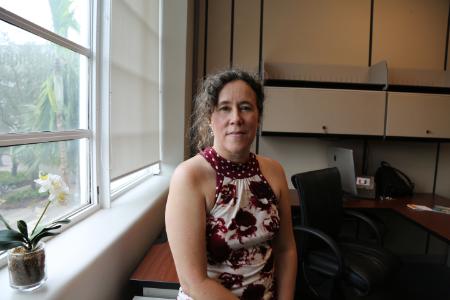When Yolanda Martínez San Miguel was still early in her studies of contemporary Latin American and Caribbean literatures, she didn’t expect to have much academic use for the politics and poetry of the New World when it was nearly brand new. But that was before Martínez San Miguel, the new Marta Weeks Chair in Latin American Studies in the Department of Modern Languages and Literatures, learned of the life and work of Sor Juana Inés de la Cruz, a poet, philosopher, and nun during Mexico’s 17th-century colonial period. Her introduction to the self-taught Sor Juana happened during a graduate survey course at the University of California Berkeley, and it would turn out to be a serendipitous encounter.
 |
| Yolanda Martinez San Miguel is the new Weeks Chair in MLL |
Often referred to as “The Phoenix of America” and “The Tenth Muse,” de la Cruz’s intellectual force and fearlessly feminist literary output have fascinated scholars for centuries—and Martínez San Miguel soon became one of them. “I just fell in love,” she said.
“In her writing, Sor Juana asked very tough questions about the place of women in the Americas in the 17th century, a time when women were not allowed to go to the university or participate in philosophical debates,” Martínez San Miguel said. “So literature became her avenue to think about knowledge production and colonialism. Her works changed the entire direction of my research.”
Sor Juana became the subject of Martínez San Miguel's first book, published in 1999, and, across the more than three centuries separating the two women’s lives, came to inform her view of the present as well as the past. In particular, Martínez San Miguel said her historical studies broadened her understanding of colonialism and its lingering effects—a highly relevant issue in many Caribbean nations today.
That’s especially the case for Puerto Rico, where Martínez San Miguel taught for a year and a half at her undergraduate alma mater, the University of Puerto Rico, after completing her doctorate at Berkeley.
Even decades before Hurricane Maria left Puerto Rico in ruins, the U.S. commonwealth has been in a state of economic crisis—a result of the social and economic structures lingering from the country’s beginnings as a Spanish colony in the 15th century, followed by its extended colonial relationship with the United States. The island’s crushing debt and widespread poverty provided Martínez San Miguel a backdrop similar to colonial Mexico during Sor Juana’s life. Hurricane Maria brought these grievous disparities into even bolder relief.
Engaging With Colonial Echoes
Martínez San Miguel has pursued this line of inquiry through a series of books that engage contemporary issues on many fronts, including 2014’s Coloniality of Diasporas: Rethinking Intra-Colonial Migrations in a Pan-Caribbean Context. She won the 2017 Sylvia Rivera Award in Transgender Studies for Trans Studies: The Challenge to Hetero/Homo Normatives, which she co-edited with her Rutgers University colleague, Sarah Tobias.
Following teaching stints at Princeton and the University of Pennsylvania, Rutgers was Martínez San Miguel’s academic home for more than a decade before she joined the University of Miami this year as the Weeks Chair. Her students can look forward to an illuminating discussion about the continued relevance of centuries-old writings.
“Some students find the currency of colonialism surprising, but not all,” she said. “It often depends on where they’re from. Students from India, for example, totally understand the contradictions of countries that are independent yet still deal with colonial structures and mentalities.
“Here in the U.S., the whole racial debate has a colonial dimension. When did race become defined the way we know it today? Colonial notions continue to inform the way we think about race through inherited language, knowledge, systems, and institutions. It can be a struggle to learn about these realities while unlearning racist and colonial legacies.”
For students, she said, that struggle can cause defensiveness—especially at a time when the country’s overall conversation about race is at a fever pitch.
“It’s hard to see a system and engage it, knowing it is not a question of feeling guilty for it,” Martínez San Miguel said. “Perhaps you are not guilty, but you are responsible for the system in which we all live. Usually the first response is, ‘But I’m not a racist or an imperialist!’ Sometimes it’s the white student who feels most challenged.
“There can be heated debates in class, and my role is to protect everybody so they can say what they need to say, be listened to, and also listen themselves,” she continued. “It’s my responsibility to open space for everyone to listen and unlearn what we take for granted, so we can transform the world in which we live.”
By David Menconi
A&S News
October 05, 2017

